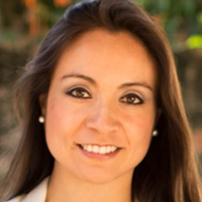
Dr. Isabel B. FrancoSustainability Scientist, United Nations University
Japan
Growing up in Colombia, a developing country rich in natural resources, I struggled to access quality education, find gainful employment opportunities, and advance my career. At a loss for what to do, I decided to gather up my small savings, pack my bags full of my dreams, and leave Colombia to relocate to Australia. After only a few months in Australia my savings ran out, so I worked all kinds of random jobs to pay for my studies. But in the end, I was not able to make enough money to stay in school. In my desperation, I decided to start knocking on doors, and I was lucky enough to come across angels who were willing to invest in my education. I was awarded a scholarship to work toward a PhD. Why did I have to struggle so much to access education and gainful employment opportunities when my country was so rich with minerals, metals, and other natural resources? To add to my dismay, I soon found out I was not alone. Through my research I came to understand that many other women––particularly those adjacent to disruptive industries such as mining, oil and gas in Latin America––struggle to access education, employment opportunities, and other forms of human capital; and women in other resource-rich regions of Asia and Africa experience the same reality. My research led me to the conclusion that there is a simple solution to this crisis. Stakeholders in resource-rich regions must invest wisely in five forms of capital: education, employment, entrepreneurship, leadership, and innovation. Investment in these areas will show a real commitment to sustainability that will make a huge difference in the lives of women and girls around the globe. Further details on my personal story and linkages to women and sustainability leadership can be watched in my most recent TED Talk ‘Beautiful Women: Ugly Reality’. After all my research in Latin America, Africa in Asia Pacific, I began to feel a huge sense of responsibility to these women and girls. I knew I had to do something about this global predicament, and I was acutely aware that research alone was not going to solve the problem. Instead, if I really wanted to create change in the lives of women all around the world, I had to use what I researched, and move from theory to impactful research and practice. And this is how the eLab for Women in Sustainability Excellence and Leadership -eWisely was born. Since then, I became a strong advocate for women leadership in sustainability and my advocacy has always been regarded as entrepreneurial, innovative and impactful. In 2014 I was appointed as a global leader by The University of Queensland, Australia for undertaking scientific research and build capacity on women, sustainability and leadership globally. In collaboration with sustainability scientists and practitioners from 43 eHubs in Latin America and the Caribbean, Asia and Africa; the eLab undertakes and showcases scientific and policy-relevant research to push global-local boundaries to place women at the centre of sustainability agendas. The eLab conveys the voice and development aspirations of women leaders and those coping with adverse impacts of unstainable practices.
I condidered myself a female leader in sustainability concerned about inclusive and sustainable global change. My ambition is to empower women leaders to contribute to a more equal and sustainable world that places women and girls at the centre of sustainable development. I am currently a scientist at the United Nations University – Institute for the Advance Study of Sustainability. With a focus on women in postconflict regions, my current investigation advances knowledge on global governance for impactful sustainability research and education. My academic expertise cuts across different fields of sustainability science, such as Gender Aspects of Sustainable Development, Education and Impactful Research for Sustainable Development, Corporte Sustainable Responsibility and Sustainable Livelihoods. I have extensive experience in liaising with international organizations, governments, the private sector, academia and civil society globally. I have lived, worked, and undertaken field research in Oceania, Asia, the Americas, and Africa to explore the linkages amongst women, sustainability and leadership. I have been appointed as sustainability advisor and lead researcher at UNESCAP, UNDP, the British Council, and the International Mining for Development Centre (IM4DC) –now MEfDA-. In these appointments, I have successfully undertaken research and implemented multi-stakeholder engagement processes for sustainable community development with a focus on women. I have also featured as a guest lecturer in sustainability at various universities globally and have been awarded competitive research grants to explore the impact of global sustainability dynamics for vulnerable community groups, particularly for women and girls. I hold a Ph.D of Governance and Sustainability from The University of Queensland Australia, MA Educational Management, BA Education and Languages and BA Public Administration. I am the Editor-in-Chief of the International Journal of Women, Sustainability and Leadership Studies. I have published in my areas of expertise in English, Spanish, and Portuguese. My most recent book titles ‘Socially Responsible Business: A Model for a Sustainable Future’ published by the United Nations Economic and Social Commission for Asia and The Pacific (UNESCAP).